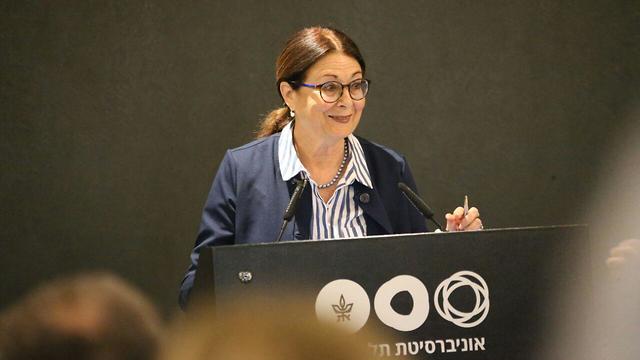
Supreme Court Chief Justice Esther Hayut
צילום: מוטי קמחי
Supreme Court chief justice: Judicial review is guarantee for democracy
Chief Justice Hayut comes out against giving Knesset authority to override High Court rulings that struck down laws, arguing judicial review is vital to protect the fundamental values of democracy, including equality before the law and human rights.
Supreme Court Chief Justice Esther Hayut came out on Sunday against government attempts to amend the law to allow the Knesset to override High Court of Justice decisions, arguing the only guarantee for democracy is "an independent, professional and objective justice system, which exercises judicial review that protects the basic constitutional principles of the system."
Hayut gave a lecture at the Cymbalista Synagogue and Jewish Heritage Center at Tel Aviv University on protecting social unity in Israel.
"As early as the first days of the state, there were profound disagreements on how to turn the vision of the Israeli democracy from a dream into a reality and preserve it while facing the complex challenges posed by our lives here," she said.
"A judicial ruling, by its very nature, is always at the center of disagreement. This can also be true for debates over public disagreements, decisions over which will likely never be able to satisfy the entire public," Hayut continued.
The Supreme Court chief justice went on to argue that justice "is one of the fundamental elements on which a community, a society and a culture could be established," this makes the court, therefore, "an arena of unity" and "the institution that implements and protects the fundamental values that constitute the infrastructure for the home of the Jewish people on the basis of democracy."
Among these values, Hayut said, is equality before the law, human rights and judicial review. "All of these principles are the vital links that connect the different parts of society, and we as judges consider their protection to be the main part of our job," she explained.
Hayut noted this task was not simple. "We, the judges, desire the court to be a place people could turn to, which provides a fair answer and assistance to different groups in the population, while maintaining proportional balance when there is a clash between values that all deserve to be protected," she said.
The High Court, she said, has implemented the principles of tolerance, sensitivity and restraint in many of its rulings throughout the years in addition to "seeking to reach agreed upon and pragmatic solutions that would make the need for a judicial decision on explosive social issues unnecessary."
The High Court justices are not entirely opposed to amending Basic Law: Legislation to give the Knesset the authority to override their rulings. The argument with the political echelons revolves around the required majority of Knesset members to bypass a High Court ruling. While the justices support having a supermajority of 80 MKs (out of 120), Ministers Ayelet Shaked and Naftali Bennett are pushing a proposal that would require only 61 MKs to override a High Court ruling that struck down a law passed by the Knesset.











